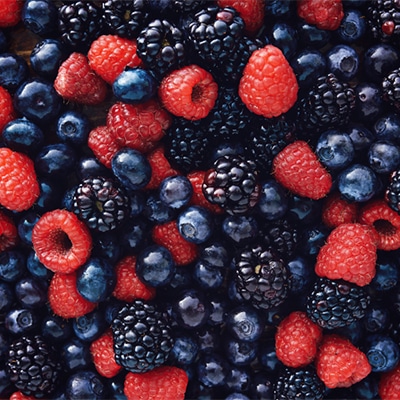
This time of year always sees a plethora of media around wonder diets and superfoods that cure all manner of diseases and disorders. One of the foods often mentioned are berries.
But is there really something about berries?
Interest in the specific properties of fruits and vegetables and their relationship to health is understandable. We know that dietary patterns with high fruit and veg intake typically have positive associations with health benefits, and scientists are keen to discover why this is.
Relationships with Dementia
Recently interest has been particularly focussed on plant compounds, with exotic sounding names like polyphenols and flavonoids, in the treatment or prevention of dementia. Berries in particular are rich in a subset of polyphenols called anthocyanins, found for example in strawberries and blueberries.
There are in fact an enormous number of individual types of polyphenols in plant foods, and we still have much to learn about their actions individually and in combination with each other. Researchers have suggested that they have some antioxidant and anti-inflammatory properties, and may even be protective of brain cells from chemical stressors that increase as we age.
In terms of cognition, some promising animal research suggests that berry or berry extracts may have an effect on mental functioning and memory. The most recent such study, published at the end of last year, reported that strawberry or blueberry supplementation in aged rats’ improved working memory.
Studies in rats are not equivalent to studies in humans
However, we are some way from really knowing whether consumption of fruits such as berries, (including how many and for how long) could limit age-related deterioration in cognition function.
Human studies in this area are sparse. The most talked about is probably the US Nurses’ Health Study – the results of which were published a couple of years ago. This long term study has followed female nurses since the 1970s. The researchers used data from around 15 000 of the women aged over 70 years that had completed cognitive tests, and looked at whether there was any association between cognitive decline and eating berries. The study suggested that the women who ate more than a serving of blueberries or more than 2 servings of strawberries a week showed slower decline in memory and cognition than those who reported eating the berries less than once a month.
We need to interpret these results with caution as there may be many other factors at play here. As of today – January 2016 – there are no human studies to prove a causal relationship between the consumption of berries or indeed anthocyanins, or any flavonoid, and cognitive functioning.
Whole fruits may be better than a supplement
And for those that think perhaps an anthocyanin supplement would be a good idea to introduce in our diets or to people in care homes – It seems that the multiple components in plant foods may be of greater benefit than a single polyphenol – in other words, the whole is greater than the sum of its parts.
So the message remains to eat a varied, plant-rich diet. And whilst there is no significant evidence yet that berries may be beneficial in the fight against dementia, they are a nutrient-rich fruit and as such can have a place on menus – frozen berries for example are great in smoothies or fruit puddings.
Berry New Year!



